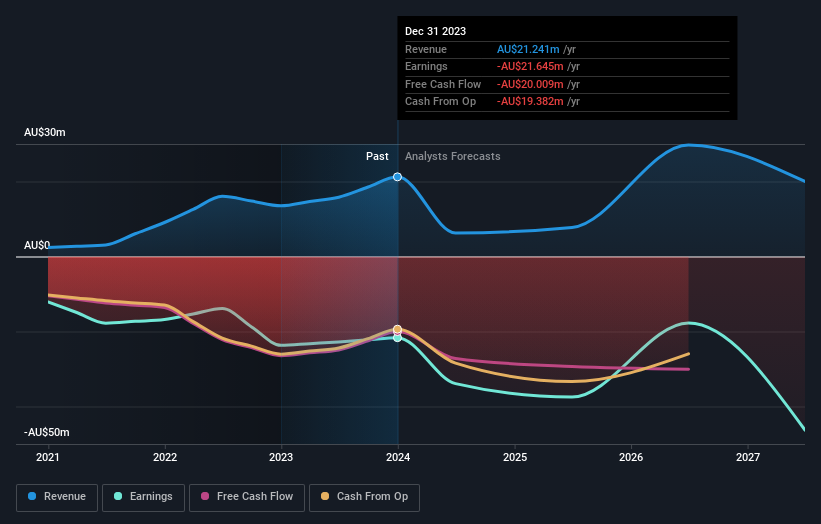PYC Therapeutics Limited (ASX:PYC) insiders seem bullish, own 46% and have been buying more recently
Key Insights
Insiders appear to have a vested interest in PYC Therapeutics' growth, as seen by their sizeable ownership
The top 6 shareholders own 51% of the company
If you want to know who really controls PYC Therapeutics Limited (ASX:PYC), then you'll have to look at the makeup of its share registry. And the group that holds the biggest piece of the pie are individual insiders with 46% ownership. That is, the group stands to benefit the most if the stock rises (or lose the most if there is a downturn).
A quick look at our data suggests that insiders have been buying shares in the company recently. This might indicate that they expect share prices to rise in the near future.
Let's delve deeper into each type of owner of PYC Therapeutics, beginning with the chart below.
Check out our latest analysis for PYC Therapeutics
What Does The Lack Of Institutional Ownership Tell Us About PYC Therapeutics?
Institutional investors often avoid companies that are too small, too illiquid or too risky for their tastes. But it's unusual to see larger companies without any institutional investors.
There are multiple explanations for why institutions don't own a stock. The most common is that the company is too small relative to funds under management, so the institution does not bother to look closely at the company. On the other hand, it's always possible that professional investors are avoiding a company because they don't think it's the best place for their money. PYC Therapeutics might not have the sort of past performance institutions are looking for, or perhaps they simply have not studied the business closely.
Hedge funds don't have many shares in PYC Therapeutics. Our data shows that Alan Tribe is the largest shareholder with 34% of shares outstanding. Mccusker Holdings Pty. Ltd. is the second largest shareholder owning 4.0% of common stock, and Sietsma Holdings Pty. Ltd. holds about 3.6% of the company stock.
We also observed that the top 6 shareholders account for more than half of the share register, with a few smaller shareholders to balance the interests of the larger ones to a certain extent.
While it makes sense to study institutional ownership data for a company, it also makes sense to study analyst sentiments to know which way the wind is blowing. There are plenty of analysts covering the stock, so it might be worth seeing what they are forecasting, too.
Insider Ownership Of PYC Therapeutics
The definition of an insider can differ slightly between different countries, but members of the board of directors always count. The company management answer to the board and the latter should represent the interests of shareholders. Notably, sometimes top-level managers are on the board themselves.
Most consider insider ownership a positive because it can indicate the board is well aligned with other shareholders. However, on some occasions too much power is concentrated within this group.
It seems insiders own a significant proportion of PYC Therapeutics Limited. Insiders have a AU$256m stake in this AU$560m business. It is great to see insiders so invested in the business. It might be worth checking if those insiders have been buying recently.
General Public Ownership
With a 41% ownership, the general public, mostly comprising of individual investors, have some degree of sway over PYC Therapeutics. While this group can't necessarily call the shots, it can certainly have a real influence on how the company is run.
Private Company Ownership
Our data indicates that Private Companies hold 13%, of the company's shares. It might be worth looking deeper into this. If related parties, such as insiders, have an interest in one of these private companies, that should be disclosed in the annual report. Private companies may also have a strategic interest in the company.
Next Steps:
I find it very interesting to look at who exactly owns a company. But to truly gain insight, we need to consider other information, too. Case in point: We've spotted 4 warning signs for PYC Therapeutics you should be aware of, and 1 of them is significant.
If you would prefer discover what analysts are predicting in terms of future growth, do not miss this free report on analyst forecasts.
NB: Figures in this article are calculated using data from the last twelve months, which refer to the 12-month period ending on the last date of the month the financial statement is dated. This may not be consistent with full year annual report figures.
Have feedback on this article? Concerned about the content? Get in touch with us directly. Alternatively, email editorial-team (at) simplywallst.com.
This article by Simply Wall St is general in nature. We provide commentary based on historical data and analyst forecasts only using an unbiased methodology and our articles are not intended to be financial advice. It does not constitute a recommendation to buy or sell any stock, and does not take account of your objectives, or your financial situation. We aim to bring you long-term focused analysis driven by fundamental data. Note that our analysis may not factor in the latest price-sensitive company announcements or qualitative material. Simply Wall St has no position in any stocks mentioned.
Have feedback on this article? Concerned about the content? Get in touch with us directly. Alternatively, email editorial-team@simplywallst.com

 Yahoo Finance
Yahoo Finance 

